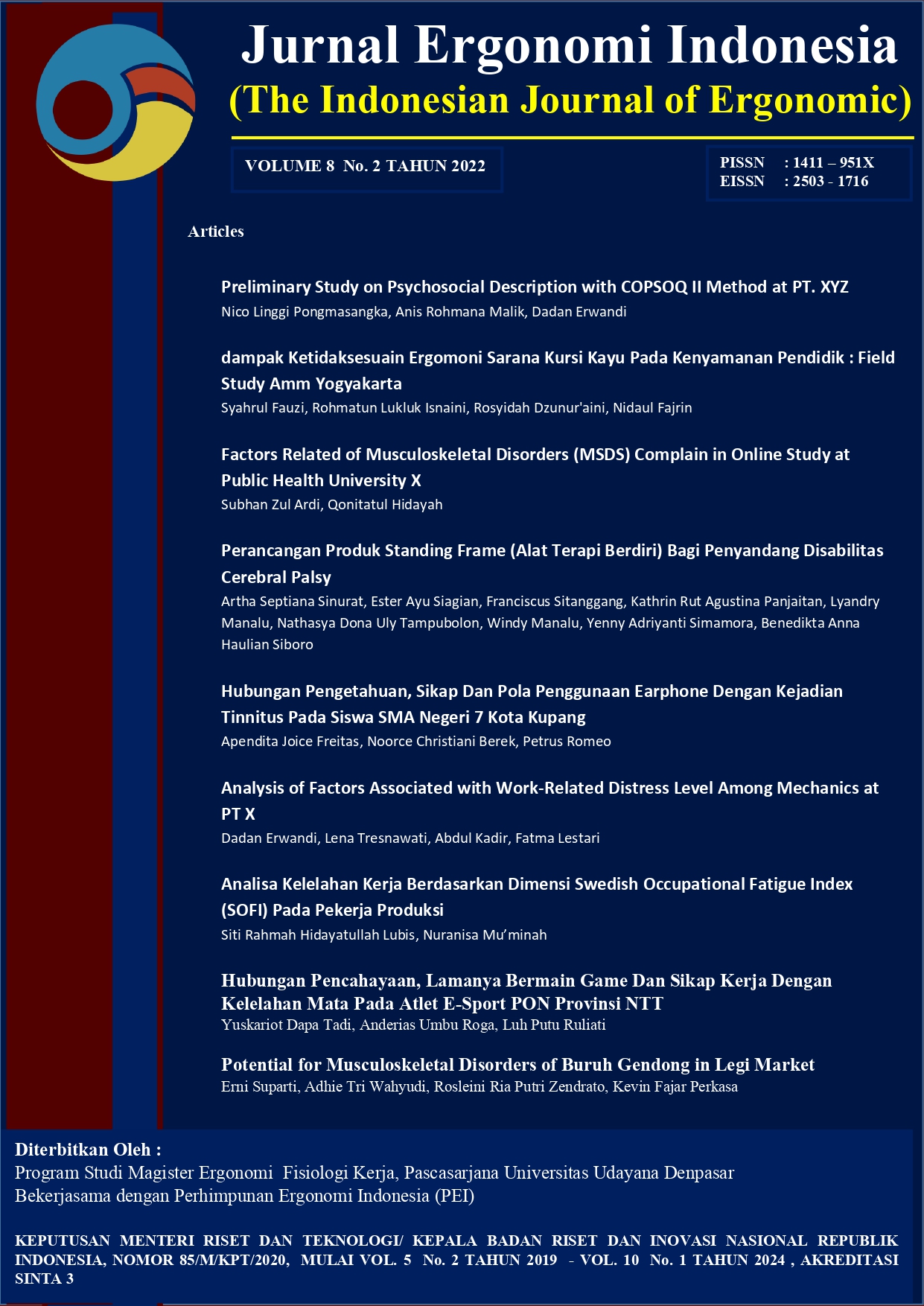Hubungan Pengetahuan, Sikap Dan Pola Penggunaan Earphone Dengan Kejadian Tinnitus Pada Siswa SMA Negeri 7 Kota Kupang
Abstract
The development of telecom and audio-visual technology has increased rapidly with the discovery of various portable devices, one of which is earphones. The problem is that improper use of earphones can cause various hearing problems, one of which is tinnitus. The initial study conducted foud than out of 10 students interviewed, 9 of them experienced tinnitus. The aims of the study is to aware the correlations of knowledge, attitude and earphone usage pattern with tinnitus incidence on SMA Negeri 7 Kupang City students. This is a quantitative study with approach by cross-sectional. There is 75studens total sample which selected with consecutive technique sample. Each of the variables was studied with the Chi Square test to determine the relationship with the tinnitus incidence variable. The results of the statistical test showed the relationship of knowledge of earphone use with the incidence of tinnitus p = 0.004 (< 0.05), the p value of the earphone usage attitude variable with the tinnitus incidence variable is known to be p=0,015 (<0,05), and the relationship of earphone use patterns with the incidence of tinnitus p = 0.000 (<0.05). In conclusion, there is a relationship between knowledge, attitudes and earphone usage pattern with tinnitus incidence on students of SMAN 7 Kupang City.
Downloads
References
Baguley, D., McFerran, D., & Hall, D. (2013). Tinnitus. The Lancet, 382(9904), 1600–1607. https://doi.org/10.1016/S0140-6736(13)60142-7
Fatimah. (2021). Hubungan Antara Karakteristik Penderita Tinnitus Dengan Kualitas Hidup Pasien : Systematic Review. 19. https://repositori.usu.ac.id/bitstream/handle/123456789/30694/170100072.pdf?sequence=1&isAllowed=y
Geocze, L., Chandrasekhar, S. S., Mucci, S., Tsuneo Onishi, E., & Penido, N. de O. (2018). Quality of Life: Tinnitus and Psychopathological Symptoms. Neuropsychiatry, 08(05). https://doi.org/10.4172/neuropsychiatry.1000483
Kemdikbud. (2022). SEKOLAH KITA. Kemendikbd Senayan Jakarta, 10270. https://sekolah.data.kemdikbud.go.id/index.php/chome/profil/841fd6fa-9134-480b-8db3-5bc80133b861
Kurniawati, S. P. (2017). Intensitas Kebisingan Terhadap Gangguan Pendengaran dan Keluhan Tinnitus pada Pekerja Penggilingan Daging di Kabupaten Jember. In Kesehatan Masyarakat. http://repository.unej.ac.id/bitstream/handle/123456789/75992/Dian Pratiwi - 132310101064 -1.pdf?sequence=1
McCormack, A., Edmondson-Jones, M., Somerset, S., & Hall, D. (2016). A systematic review of the reporting of tinnitus prevalence and severity. Hearing Research, 337, 70–79. https://doi.org/10.1016/j.heares.2016.05.009
Monding, F. F., Kawatu, P. A. T., Kalesaran, A. F. C., Kesehatan, F., Universitas, M., Ratulangi, S., Pain, N., & Online, K. G. (2020). Hubungan Kecanduan Game Online Dengan Keluhan Neck Pain Pada Mahasiswa Fakultas Kesehatan Masyarakat Universitas Sam Ratulangi. Kesmas, 9(6), 122–130. https://doi.org/https://ejournal.unsrat.ac.id/index.php/kesmas/article/view/30943
Notoatmodjo, S. (2003). Ilmu Kesehatan Masyarakat. PT Rineka Cipta.
Nugroho, D. A. (2015). Hubungan Frekuensi dan Intensitas Tinnitus Subjektif dengan Kualitas Hidup Pasien. (HERMAWAN, 2020), 45(1), 19–26. https://doi.org/https://www.researchgate.net/publication/327957749_Hubungan_frekuensi_dan_intensitas_tinitus_subjektif_dengan_kualitas_hidup_pasien
Purintyas, I. (2006). ADLN Perpustakaan Universitas Airlangga Skripsi Hubungan antara paparan kebisingan dengan keluhan tinnitus. 96. https://doi.org/http://repository.unair.ac.id/21900/7/gdlhub-gdl-s1-2006-purintyasi-2507-fkm114-6.pdf
Purnaningtyas, D., Ambarika, R., & Anggraini, N. (2016). Pengaruh Lamanya Pemakaian Headset Terhadap Hasil Tes Audiometri di Poli THT RSUD dr Iskak Tulungagung. Jurnal Keperawatan, 1, 3–6.
Purwita Agustini, D. (2016). Mengenali Gejala Tinitus Dan Penatalaksanaannya. Intisari Sains Medis, 6(1), 34. https://doi.org/10.15562/ism.v6i1.17
Rahmi, U., Achmad, B. F., & Marliah, N. (2017). Pengetahuan Siswa Kelas X Dan Xi Tentang Penggunaan Earphone Di Sma Pasundan 8 Kota Bandung. Jurnal Pendidikan Keperawatan Indonesia, 2(2), 77. https://doi.org/10.17509/jpki.v2i2.4742
Sarah, N. A., Lintong, F., & Rumampuk, J. F. (2016). Hubungan Penggunaan Earphone Dengan Gangguan Pendengaran Pada Siswa SMA Negeri 9 Manado. Jurnal KEDOKTERAN KLINIK (JKK), Volume 1 No 2, Desember 2016, 1(2), 37–45. https://doi.org/https://ejournal.unsrat.ac.id/index.php/jkk/article/view/14363
Silitonga, N., Adnan, A., Isranuri, I., Haryuna, T. S. H., Ilmu, D., Telinga, K., Bedah, T., Leher, K., Kedokteran, F., Sumatera, U., Rumah, U., Umum, S., Haji, P., & Malik, A. (2014). Hubungan Kebisingan Dengan Pendengaran Pekerja (Studi Kasus Diskotik A, B, C Di Kota Medan). Ilmu Kesehatan Telinga Hidung Dan Tenggorok Bedah Kepala Leher, 51, 7. https://doi.org/https://media.neliti.com/media/publications/160350-ID-none.pdf
Susiyanti, E., Imanto, M., Kedokteran, F., Lampung, U., Tht-kl, B. I. K., Kedokteran, F., & Lampung, U. (2020). Efek Penggunaan Earphone sebagai Faktor Resiko Kejadian Noise Induced Hearing Loss The Effect of Earphone Use as a Risk Factor for Noise Induced Hearing Loss. Majority, 9, 63–67.
Velaro, A. J. (2021). Hubungan Pola Penggunaan Earphone Dengan Angka Kejadian Tinitus Serta Tingkat Keparahan Tinitus Yang Diukur Dengan Visual Analog Scale Dan Tinitus Handicap Inventory Questionaire Pada Mahasiswa Fakultas Kedokteran Universitas Sumatera Utara. 80. https://doi.org/https://repositori.usu.ac.id/handle/123456789/30954

















